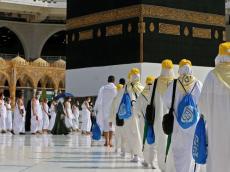|
|
TODAY.AZ / World news
Saudi Arabia bans taking children to Hajj
11 February 2025 [09:00] - TODAY.AZ

By Alimat Aliyeva
The Ministry of Hajj and Umrah in Saudi Arabia has announced that pilgrims will not be allowed to bring children with them during the Hajj season in 2025.
This decision was made to ensure the safety of children, as the Hajj pilgrimage attracts a massive crowd each year, making it challenging to ensure their safety in such large gatherings.
In addition to this measure, the Ministry has introduced several new initiatives aimed at improving the safety and organization of the Hajj experience. These include campaigns to raise awareness about safety measures, the introduction of intelligent systems designed to guide and regulate the movement of pilgrims to holy sites, and the modernization of tent camps and pathways to enhance comfort and facilitate the performance of religious rituals.
The Ministry also confirmed that, as in previous years, priority for participation in Hajj will be given to those who have not yet undertaken the pilgrimage. This helps ensure that as many people as possible are able to experience the sacred journey.
Registration for the 2025 Hajj season is already officially open to citizens and residents of Saudi Arabia through the Nusuk app and the official online portal. The app and portal are part of the Ministry's ongoing efforts to streamline and digitalize the registration process, making it more efficient and accessible.
Interestingly, the use of advanced technology, including AI and data analytics, has been integrated into various aspects of the Hajj experience in recent years. From crowd management to real-time tracking of pilgrims, these innovations are designed to prevent accidents and improve the overall pilgrimage experience. Additionally, there are plans to continue expanding the digital infrastructure to make the Hajj more accessible to a global audience, particularly in light of the ongoing challenges posed by the COVID-19 pandemic.
As the Hajj season draws closer, these changes and innovations are likely to play a key role in ensuring the safety, comfort, and spiritual fulfillment of the millions of Muslims who undertake this sacred journey each year.
URL: http://www.today.az/news/regions/256931.html
 Print version
Print version
Connect with us. Get latest news and updates.
See Also
- 11 February 2025 [23:30]
China starts using four legged rescue robots of its own production - 11 February 2025 [20:47]
Investor confidence index grows in Eurozone - 11 February 2025 [18:19]
China creates group of experts to protect Earth from asteroid threat - 11 February 2025 [09:00]
Saudi Arabia bans taking children to Hajj - 11 February 2025 [08:00]
Decline in number of marriages in China increases concerns about birth rate in 2024 - 10 February 2025 [22:28]
China begin to impose duties on imported products from United States - 10 February 2025 [21:21]
World's fastest supercomputer, El Capitan launches in the USA for secret research - 10 February 2025 [19:50]
Japan's national debt reaches record high - 10 February 2025 [19:21]
Aero India Aerospace Exhibition launches in India - 10 February 2025 [18:46]
Christie's hold AI Art auction
Most Popular
 Mono-Armenia what tales did Pashinyan tell in Washington
Mono-Armenia what tales did Pashinyan tell in Washington
 Pashinyan signed up for a ChatGPT course
Pashinyan signed up for a ChatGPT course
 Turkiye’s President Erdo?an approves migration cooperation agreement with Azerbaijan
Turkiye’s President Erdo?an approves migration cooperation agreement with Azerbaijan
 Azerbaijan’s fire safety service reviews 2024 successes and prepares for 2025
Azerbaijan’s fire safety service reviews 2024 successes and prepares for 2025
 Chamber and Organ Music Hall to hold series of concerts
Chamber and Organ Music Hall to hold series of concerts
 Azerbaijan’s Consulate in Los Angeles reopens after wildfires
Azerbaijan’s Consulate in Los Angeles reopens after wildfires
 Azerbaijan bans entry of Russian MP over offensive remarks
Azerbaijan bans entry of Russian MP over offensive remarks
